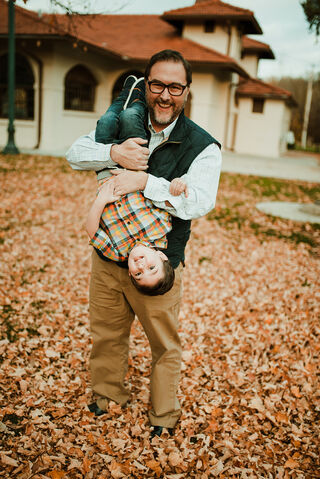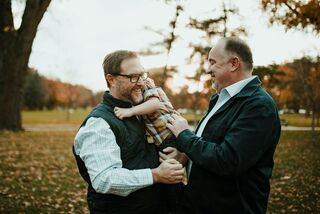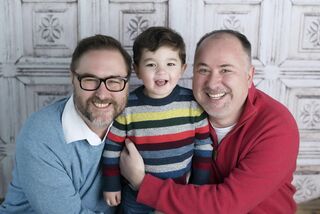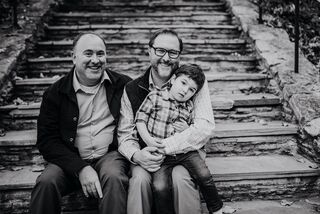Parenting
Experiencing the Unimaginable: Dying and Leaving Your Child
A father takes death head-on.
Posted August 30, 2020 Reviewed by Ekua Hagan
A reverend in North Carolina shares an anecdote in Instagram stories from a seminary professor. After the professor shared her personal narrative, a man in the audience asked, "Who do you cite on this?" She answered: “I don’t need a citation—I am the citation.”

Dr. Chad McBride researches communication concerning “personal relationships by examining broader cultural representations and discourse about relationships in the media.” In January of this year, Chad received a diagnosis of Amyotrophic Lateral Sclerosis (ALS), or Lou Gehrig’s disease, which has a life expectancy of three to five years from diagnosis. Two months later, his university and his town went into lockdown for COVID-19. Suddenly, plans to make his final memories with his husband Allen and young son Jackson evaporated. Disney? Closed. And when would it open? Would he be able to travel then?
For us, Chad is the citation. A queer, married man living his truth in Omaha, Nebraska, an adoptive father, a professor, and now a person with what he, with the help of a therapist, refers to as a “life-limiting illness,” is preparing for the inevitable, but on a different time-scale. As scholars interested in health and medical humanities, we (Bethany and Maggie) are drawn to stories that reorient health care to what matters to patients, clinicians, and their families. In Chad’s case, we are inspired by how he discloses his grief while he wrestles with legacy building and continuing to make a difference in the world. A prolific scholar, he is turning his attention toward what he leaves to his son Jackson (4+), rather than leaving more to the academy. Chad is presently recording his voice singing happy birthday to Jackson, reading stories such as Charlotte’s Web, and finalizing a proposal to publish his memoirs. This tiny post, insignificant as it is, will hopefully appear in a Google search for Jackson to find one day.
Recently, Maggie tagged Bethany on social media about how we [parents] are going to be in history books for living through a pandemic. We have a lot to learn about the experiences of individuals with ALS and the impact this pandemic has on medical treatments and research. For example, many of the clinical trials Chad may have qualified for have been postponed.

Chad’s ALS memoir is an auto-ethnography of dying in, but not necessarily from, a pandemic. His story of loss is also a story with many intersections: death and dying, disability, parenting, queerness … Chad is a living citation. We knew that we could chronicle his story in our Psychology Today column as a way to participate in his living legacy. It was a response to a call he communicated on social media for followers to offer stories for a collection. At first, he was hesitant:
I thought about [writing a memoir] and tried to do it a little bit; it was just a style of writing that was not comfortable for me. But I was compelled to write these stories down to tell Jackson when I can’t tell them anymore. And now … I’ve got a literary agent and maybe it will become a bigger thing than just stories for Jackson. As communication people … you know everyone’s reality is socially constructed. The way that I view myself isn’t the way others would view me necessarily. I thought I should try and capture those so he [Jackson] can hear other voices besides just mine. It came from her [my therapist] pushing me to think about legacy … I’ve gotten a few so far, and it’s been overwhelming in good and bad ways. Like I cry a lot, but also, it’s helped me reminisce, and I think it’s gonna be useful for him, if and when he chooses to read all this stuff so … [long pause] part of it is the stories about my life that I won’t have the chance to tell him, but the biggest thing is how much [Jackson is] loved [choking up]
… [there] are discourses that reinforce the need or the assumption that [children] at least need a mother-figure (and ideally a mother and father) … I struggle with this. I know that culturally mothering is equated for nurturing, caring, etc. And certainly, all children need this. However, even in cross-sex parenting relationships, it is not always the female who does this sort of parenting … So neither of us are exclusively the “mother-er.” And I would hope that in straight couples this would be the case as well, which makes the notions of mothering a complete misnomer.

Chad revealed to us, through his own life, that the whole idea of “a mother” encompasses so much more and so much less than we allow it to. Chad’s plan to leave a host of resources for Jackson — publications, posts, recordings, written notes — is reflective of these categorical limits. As Chad and his beloved husband Allen move through this chapter of their time together, we are honored to witness the emotional, textual, and auditory legacy they are crafting for their son.
Right now, Chad and Allen are trying to make their home accessible, as Chad’s mobility is increasingly compromised by ALS. You can support that effort here.

[Jackson, if you are reading this, your dad wanted you to find it. He loves you.]


